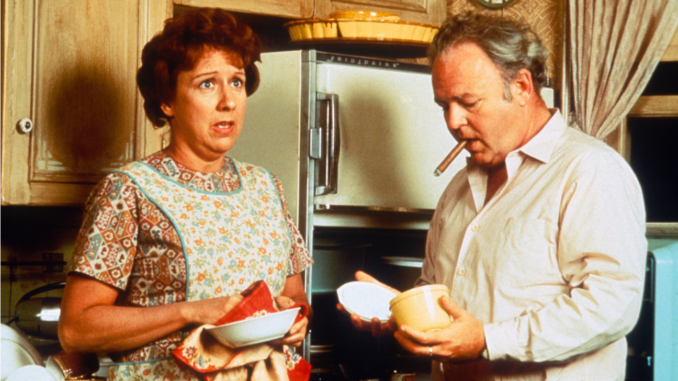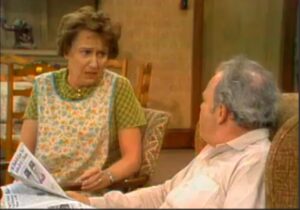
On Jan. 12, 1971, in the 9:30 p.m. time slot, the first episode debuted on CBS.
All in the Family is either going to be instant smash or instant disaster. Unfortunately for Bud Yorkin and Norman Lear, who based this on the British series Till Death Do Us Part, the latter is more likely to occur. The majority of television viewers will find this show tasteless, crude, and very unfunny. Lear, who also wrote this first episode, is to be congratulated for finally giving television the relevance it has called for, but after last season’s “relevant September” he and CBS really took a chance. All in the Family was directed by John Rich.
Billed as adult social satire, All in the Family features a central character similar to Peter Boyle’s Joe. Archie, played well by Carroll O’Connor, is married to a ding-bat superbly played by Jean Stapleton. It is with Miss Stapleton’s lines and delivery that this show gets the most genuine laughs. Living with O’Connor and Miss Stapleton are their daughter and son-in-law played by Sally Struthers and Rob Reiner. The kids are liberals and mom and pop conservatives and never the twain shall meet.

Each character is a caricature, and the initial half-hour consisted of an argument about minority groups set off by Negro Michael Evans who [plays] O’Connor’s handy man. Argument reaches its height when Evans jokingly assumes O’Connor is Jewish because he uses a Yiddish expression. The language used on this show such as “yid,” “heeb,” “coon,” etc., will most certainly offend, no matter how realistic it is.
The main problem with this show is that in order to achieve laughs in a family satire, there must first be an underlying feeling of love among all parties. Without that foundation, all that comes out is just plain hate. CBS has said it put this show on the air hoping that audiences will laugh at all sides, realizing that all the hate in today’s world is absurd. It doesn’t work. It just adds to the problem. — Sue Cameron
